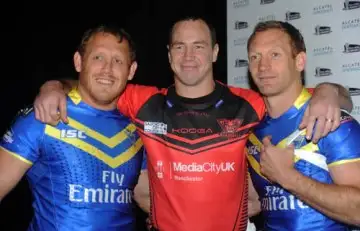Morley hails State of Mind approach

Salford’s veteran prop Adrian Morley feels that rugby league as a sport is now approaching mental health issues in a much more intelligent and sensitive way than it used to do.
Recent tragedies have taken their toll, however, and the 37-year-old believes that a wider understanding of psychological issues can only improve things further.
“Unfortunately it took the tragic passing of Terry Newton for everyone to take on board that there could a problem for players and ex-players,” he told State of Mind.
“There’s a lot of issues which go on in rugby league, which not many people know about, especially post-playing with depression and that kind of thing.
“I think it’s showing the way for other sports, to take on board what we’re doing and get it involved in their sports too.”
Rugby league tends to be a sport where weakness is treated with suspicion out on the field.
But Morley believes that communicating about problems and sharing them can only be good for players.
“With rugby league being such a macho sport, you tend to show no weakness whatsoever, when you play and train,” he added.
“That’s the same with your mental state of mind. We’re trying to break down the old regime of not showing weakness otherwise you’ll be classed as the weak link.
“If you have got mental issues, it’s important that you speak to someone about it, and a problem shared makes everything seem better.
“There’s a lot of pressure – pressure to earn a contract, pressure to get in the team, pressure to pay the bills, injuries.
“And also, when you finish playing, you’ve been in a system where you’ve been told where to go, how to train, what to eat, your whole life.
“Then suddenly you’re in ‘civvy street’ and that can have a real big effect.”
A support network is vital for players, in Morley’s view, with family, friends, team-mates and coaches all able to provide a sympathetic ear.
“My family are very important to me, and any problems I’ve got, I speak to them, first and foremost,” he said.
“But in terms of problems in rugby league, your family sometimes doesn’t quite understand what’s going on.
“But you’re really close with all your team-mates. There’s always certain team-mates who you’re extra close with.
“I’ve always been open with them. Rugby league is a very open sport, there’s not much that doesn’t get said in the changing rooms.
“You have to be in quite a dark place for you not to be able to open up to your team-mates.
“But also coaches. The majority of coaches have played the game to a reasonable level, and they know the kind of pressures you’re under, so those type of people are good.
“But there’s also numbers you can ring, confidentially if you need. There are more choices available now.
“Talk about it to someone you know. It’s important that you speak to someone and get it out of your system.
“Once it’s out of your system, the ball will be rolling then. It’s really important to talk about this kind of problem.”
State of Mind takes over Super League in Round 25 for the games on the weekend of August 28-31. Look out for volunteers providing information on mental health at all grounds across the weekend.